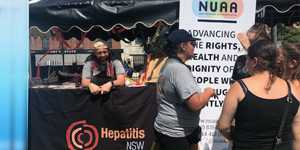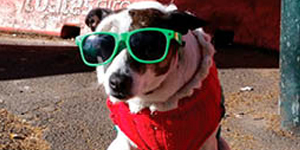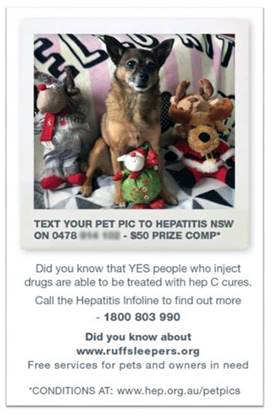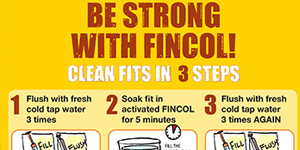The Champion Professional: Issue 69
This issue:
- Overview: Third National Hepatitis B Strategy 2018–2022
- Closing the Gap at Yabun Festival 2019
- Pet Pics reach homeless and disadvantaged people with hep C messages
- Feasibility of eliminating hep C as a public health threat
- New FINCOL poster on cleaning fits in prisons

Overview: Third National Hepatitis B Strategy 2018–2022

As noted in December’s edition of The Champion, the Australian Government recently released the 5th National Hepatitis C Strategy and 3rd National Hepatitis B Strategy; both run 2018-2022. We discussed the Hep C Strategy in December (to read >>>CLICK HERE) and, as promised, have an overview of the Hep B Strategy in this edition.
Compared to the Hep C Strategy, the 3rd National Hepatitis B Strategy is somewhat less ambitious. Unfortunately, this may be a reflection on the lack of investment, expertise, and understanding of hepatitis B across the blood borne virus sector. There are however many important issues raised, all of which serve to set the groundwork essential for eliminating hepatitis B in the years to come.
Here are some key highlights and observations about the content of The Strategy:
- Meaningful involvement of priority populations: As with hep C strategy, the hep B strategy calls for a focus on the real and genuine involvement of people living with and affected by hepatitis B. We must think innovatively about what place peer workers occupy in this sector.
- Vaccination: While focus is almost always on newborn vaccination we must look to achieve high vaccination coverage across all priority populations, not just in newborns. It’s important to recognise that lack of vaccination or lack of immunity (as vaccination doesn’t always lead to immunity), puts people at risk of hep B. Adult vaccination is a key part of our toolkit of prevention.
- Evidence-based: The Strategy makes it clear that at the heart of the response to hepatitis B is a strong evidence base. We must keep this focus.
- Failure to meet targets: There was a failure to meet the most important targets of the previous Hep B Strategy:
– 62% of people living with chronic hep B are diagnosed; the target was 80%
– 7% of people living with chronic hep B are on treatment; the target was 15%. - Increase diagnosis: The Strategy aims to increase the proportion of people diagnosed with chronic hep B to 80%. It’s currently estimated at 62%, which is lower than the 2015 level of 63%.
- Increased number of people with hep B in care: The target of The Strategy is to “Increase the total proportion of people living with chronic hepatitis B receiving care to 50%.” Keep in mind, every single person with hepatitis B must get a six monthly check-up for their hep B and liver health. And some people require regular liver cancer screening. These messages are extremely important.
- 20% receiving treatment: The Strategy has a target of 20% of people living with hep B on treatment. Remember that, not everyone with hep B requires treatment.
- Reduce hep B-related mortality: The target of a 30% reduction is tied to increasing diagnosis rates and increasing in-care rates. Six monthly check-ups and 12 monthly liver cancer screening is essential. It is estimated that 390 people in Australia died from hepatitis B related liver disease in 2017.
- GP prescribers: The expansion of hep B treatment prescribing GPs is an essential part of managing people’s hep B in their community and making regular care easier.
- Safer sex and sterile injecting equipment: Safer sex practices and the provision of sterile injecting equipment doesn’t get enough spotlight and it’s important to remember these tools are useful in the efforts to prevent hep B.
- Priority settings: As with the new Hep C Strategy, “priority settings” has been added. This is highly valuable in thinking about where people living with hep B might be more easily reached.
- Hep B cases among CALD people: The vast majority of new cases of hepatitis B were in people born in a country other than Australia, while 65% of all hep B infections in Australia are among those born outside Australia.
- Aboriginal and Torres Strait Islander people: Too often hepatitis B is framed as a virus that centres on people born overseas. However, hep B disproportionately affects Aboriginal and Torres Strait Islander peoples. 11% of the people living with chronic hep B in Australia are Aboriginal and Torres Strait Islander. Also, liver cancer is the second highest cause of cancer-related deaths in Aboriginal and Torres Strait Islander peoples – over two times greater than the non-Indigenous population. Aboriginal and Torres Strait Islander people must be kept at the forefront of our responses to hep B.
- Mothers living with hep B and their children: The Strategy makes the point that hep B infection “can have significant health implications for the mother and her baby, and the issues for each should be considered independently.” It’s important to separate the issues for the child from issues for the mother.
- Hep B diagnosis during pregnancy: During pregnancy is the only time that there is universal testing for hep B and, as such, is often when diagnosis of hep B occurs. There must be a greater focus in support and information for women who are diagnosed through antenatal screening.
- Hep B as a family health and cancer prevention issue: The Strategy makes the excellent point that “community education and resources need to contextualise hepatitis B primarily as a family health and cancer prevention issue.” Reframing hepatitis B this way makes for better engagement.
- Testing in community: Hep B testing is still largely centred within medical services such as specialist clinics, medical centres and doctors’ practices. Instead, hep B testing should be more readily available in places accessed by priority populations.
- Link the hep B sector: The Strategy calls for connecting the clinical and community elements of hep B. Lessons can be learned from the excellent integration of all elements of the hep C sector.
- Innovation: Hep B will need a unique approach; just as hep C work does not mimic exactly what is being done around HIV. More hep B focus and understanding should lead to more innovation.
- Multidisciplinary workforce: The Strategy calls for “A strong multidisciplinary workforce of motivated, trained and regularly updated health professionals, community and peer-based workers.”
- Workforce retention: The Strategy notes that issues around staff retention need to be addressed. If governments and health departments are serious about hep B then job security, proper funding, and long-term commitments are fundamental. We need to build the hep B workforce.
- Layered experience of hep B: Extra layers of stigma are more apparent with hep B because of culturally-based stigma. The Strategy makes the important point that “priority populations often face intersecting forms of disadvantage which increases their risk of infection and late diagnosis.” Similarly, we cannot box people according to the most obvious element of their situation.
- Missed items: The Strategy omits a few important hepatitis B matters, for example the need for:
– GPs to do all three hep B tests (surface antigen, surface antibody, core antibody) at first interaction.
– checking vaccination success or checking for current infection prior to vaccination.
Closing the Gap at Yabun Festival 2019

Yabun is the largest one day gathering in recognition of Aboriginal and Torres Strait Islander cultures in Australia. It’s held annually on 26 January (Australia Day, aka Survival Day/Invasion Day), upon the traditional lands of the Gadigal people in Sydney, at Camperdown’s Victoria Park. Established in 2001, Yabun (meaning ‘music to a beat’ in Gadigal language) is a free event that features live music, a bustling stalls market, panel discussions and community forums on Aboriginal issues, children’s activities, and traditional Aboriginal and Torres Strait Islander cultural performances.
Hepatitis NSW was there this year with all other 414 Close The Gap* partner organisations to engage with the community. Staff and volunteers contributed to discussions and resource distribution to the many people attending our stall. The event proved a success with close to 150 resource bags being distributed, and many one-to-one interactive discussions being held.
*Hepatitis NSW, ACON, NUAA, SWOP and Positive Life – who are all based at 414 Elizabeth St, Surry Hills – work with overlapping communities and, in recognition of Aboriginal and Torres Strait Islander peoples’ health needs, formed the “414 Close the Gap Working Group” (414 CTG). This is a collaboration intended to maximise our impact in the work we do with and on behalf of Aboriginal and Torres Strait Islander peoples.
Pet Pics reach homeless and disadvantaged people with hep C messages
 Pet Pics is a fun and exciting new Hepatitis NSW project that promotes our Hepatitis Infoline. Several pet-related and housing/homeless NGO project partners are already involved. Pet Pics is a fun and exciting new Hepatitis NSW project that promotes our Hepatitis Infoline. Several pet-related and housing/homeless NGO project partners are already involved.
The project draws on research including an interesting report – Homeless and Connected: Mobile phones and the Internet in the lives of homeless Australians. We’ve also drawn on results from an internal survey taken through five NSPs in 2018. |
What is Pet Pics?

People text us a photo of their pet which we photoshop with a health promotion message turning it into a Pet Pic. We text it back and they can share the Pet Pic as often as the like with their friends. Every two months we send all entrants an SMS text asking for votes on the best recent Pet Pic. The winner is sent a voucher (by SMS text) for a $50 Coles gift card or mobile phone credit.
Each Pet Pic also promotes one of our pet-related NGO project partners (several of which have a metro/rural presence). After several months, we hope that all people involved will know about all these valuable services:
Health Messages
Each Pet Pic message will address one of several hepatitis C treatment related issues, including misconceptions and fears, and stigma. For example:
- Fears and internal stigma around doctors’ attitudes and being treated awkwardly/rudely;
- Misconceptions around risk of reinfection and treatment eligibility (get cured, get reinfected, no longer have access to cures);
- Misconceptions around current injecting and eligibility for DAAs;
- Fears and internal stigma around poor vein health and difficulty around phlebotomy;
- OST doctors not seeing hep C DAA treatment as their “core business”;
- Belief that now is not the current time for treatment;
- Beliefs that side effects are still too much of a problem;
- Misconceptions around current injecting being an exclusion to DAA treatment;
- Belief that previous failed treatment is an exclusion to DAA treatment;
- Belief that heavy drinking is an exclusion to DAA treatment;
- Belief that being asymptomatic is an exclusion to DAA treatment;
- Belief you must see a specialist first; or
- Belief that treatment costs too much.
The source material for these messages was Understanding barriers and facilitators to the take up of new direct-acting antiviral hepatitis C treatments: The Observe study (Bryant J, Mao L, Hull P, Treloar C) and From Beyond interferon side effects: What residual barriers exist to DAA hepatitis C treatment for people who inject drugs? (Madden A, Hopwood M, Neale J, Treloar C)
Pet Pics was launched in December 2018. In addition to the pet-related NGOs listed above, we have recruited the support and involvement of Northcott (housing estate), FaCS (Redfern office), City of Sydney (Homelessness project) and Matthew Talbot Hostel.
Feasibility of eliminating hep C as a public health threat

A new paper published in J Hepatology reports, for the first time, an association between rapid uptake of hepatitis C direct-acting antivirals and a decline in prevalence of the virus among people who inject drugs.
The paper asserts that the World Health Organization’s goal to reduce hepatitis C virus incidence by 80% will be difficult to achieve without widespread scale-up, and a corresponding reduction in the prevalence of the virus among those most at risk of onward transmission. The paper’s results indicate that a population-level reduction in the prevalence of the hepatitis C is achievable through high levels of treatment and cure among people who inject drugs.
Highlights of the paper include:
- Evidence to support feasibility of elimination of hepatitis C as a public health threat.
- High uptake of hepatitis C treatment reflected in reduction in the prevalence of the virus.
- Surveillance and monitoring are required to track progress toward elimination goals.
For more information on the article >>>CLICK HERE
New FINCOL poster on cleaning fits in prisons

As most readers would be aware, there are currently no NSP or medically-supervised safe-injecting facilities available within NSW prisons. This is even though many prisoners do inject drugs, and despite the fact that prisons are a significant place for transmission for hepatitis C and other blood borne viruses. Much has been written about the need for the access to harm reduction services within prisons, and Hepatitis NSW remains committed to advocating for this to happen – until then we must work with the limited options available to NSW prisoners.
This is where FINCOL comes in. FINCOL has replaced bleach as the cleaning fluid of choice in NSW prisons and is available to prisoners, via dispensing machines, for them to clean their cells but also, if required, injecting equipment, plus tattooing and piercing gear. When used correctly FINCOL will kill hep C, hep B and HIV. Unfortunately, many prisoners are not aware of this, nor are many aware of the right way to clean equipment. For this reason, Hepatitis NSW has recently developed a new FINCOL poster for distribution to prisons and prisoners. The poster aims to improve awareness in the effectiveness of FINCOL in eliminating hep C and other blood-borne viruses, and for cleaning fits and other related injecting, tattooing or piecing equipment.
Unlike most of our other resources, this poster is not available for order or public distribution. Instead it is only being internally distributed to NSW prisons for placement in clinics and beside FINCOL machines, and to prisoners through our information packs. The reason for the restricted distribution is that, for all people outside of NSW prisons, NSPs are the recommended way to obtain sterile injecting equipment. You can however check out the poster via our website >>>CLICK HERE.
Hepatitis NSW would like to thank: participants at the Compulsory Drug Treatment Correctional Centre for participating in focus testing for the poster; the Justice Health and Forensic Mental Health Network Harm Reduction Team for their input and support; the Harm Reduction Stakeholder Group for offering to distribute the poster in prisons; Corrective Services and NSW Ministry of Health for approvals; Jasol and Brenton Davies (manufactures and distributors of FINCOL) for offering to distribute and fix posters to all FINCOL dispensing machines in NSW prisons; and our wonderful Hepatitis NSW volunteers for laminating several thousand posters.








